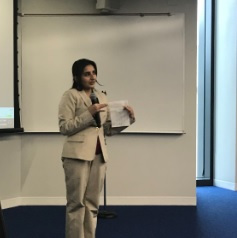Recently on Facebook, I noted that real social change usually happens when people are good enough to care about doing the right thing, thoughtful enough to figure out the best ways to do it, and brave enough to actually go through with it. On December 4th, in Washington DC, I was fortunate enough to meet a roomful of such people. I was there representing Sahiyo at an event called ‘Using Data and Community Engagement to Better Focus FGM Prevention Interventions’ sponsored by the US End FGM/C Network and The George Washington University Milken Institute School of Public Health.
 Maryah Haidery talking at the Washington DC screening.
Maryah Haidery talking at the Washington DC screening.
The event included an exceptional presentation by Sean Callaghan from the organization, 28 Too Many on how government agencies and NGOs can use data to track populations where FGM/C may be most prevalent and how best to engage with these populations. It also included a screening of Sahiyo Stories, a series of digital stories by nine different women, including myself, detailing our personal experiences with FGM/C and/or advocacy. I had volunteered to introduce Sahiyo Stories in place of Mariya Taher who was unable to attend the event. Despite some technical difficulties, I tried to summarize Mariya’s history with StoryCenter and the collaboration which culminated in Sahiyo Stories and the short behind-the-scenes video showing how we made the videos and what we hoped to gain from them.
Since this would be my first time seeing the videos with a large audience, I was a little nervous. But when Mariya’s voice came on, the room grew absolutely silent and by the end, quite a few people seemed visibly moved. During the Q&A period following the screening, I was struck by the number of people who wanted to know how they could find out more about FGM/C and what they could do to help even though this was not a problem that affected their communities. Afterward, several people from other organizations working to end FGM/C approached me with interesting suggestions on using Sahiyo Stories in conjunction with their apps and projects in order to make a greater impact on government officials or healthcare workers or educators. As I looked around the room at all these people who cared so passionately about ending this practice – people who were good and thoughtful and brave, it made me more confident than ever before that real social change was a real possibility.
To learn more about Sahiyo Stories, read:

